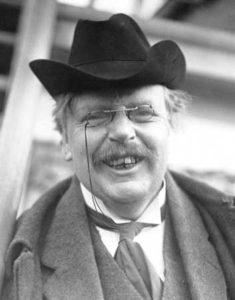G. K. Chesterton is possibly the most quotable human being of the last 200 years. He writes in surprising, paradoxical, enlightening nuggets. Here are some example:
- The Bible tells us to love our neighbors, and also to love our enemies; probably because generally they are the same people.
- Art, like morality, consists of drawing the line somewhere.
- Without education, we are in a horrible and deadly danger of taking educated people seriously.
With a quick Google search, you can find many, many more like these.
I was first formally introduced to Chesterton when my English professor told me I would enjoy his book Orthodoxy. I did. It’s a wonderful book that tells of Chesterton’s own coming to Christianity through his consideration of asylums, faerie tales, and apparent contradictions. I devoured the book.
Since then I have read many of his Father Brown mysteries, which are more accessible than Orthodoxy, and listened to The Man Who Was Thursday, which was particularly exciting because I had just had my wisdom teeth out.
I’ve had my eyes on another novel of his, Manalive, for quite awhile. Basic premise: A wildly eccentric man, Innocent Smith, is accused of heinous crimes, like shooting men and polygamy and theft, but the key to understanding them all is Smith’s exuberant love of life.
And, like all short summaries of great books, this tells you almost nothing about why the book is so great.
There’s a lot I could say about the lyrical language, the witty exchanges, the humorous characters, and the surreal adventures of Smith, and these each add to the tapestry of the book tremendously, but the heart of the story is in its ability to make the reader feel, along with its characters, that life really is more wondrous than we normally admit and that it is one of the struggles of life to keep that wonder before us.
Take for instance the telegram Smith sends his old school friend: “Man found alive with two legs.” The modern scientific men of the book find this message to be a sign of Smith’s imbecility. I mean, seriously, all men have two legs. What’s the big deal? Now three legs, that would be truly unusual.
But for Smith, and increasingly for the reader, the wonder of even having two legs becomes immensely important. To borrow yet another Chesterton quote: “When we were children we were grateful to those who filled our stockings at Christmas time. Why are we not grateful to God for filling our stockings with legs?” Smith’s innocence is that he has become a person who takes everything as a gift and every joy as something new; and the joy of Manalive is that it does, in a very real way, make the reader begin to understand and even yearn for such a view of life.
I refrain from giving many more examples because I think it is best to read the book and let it unfold. Suffice it to say, there are picnics on rooftops, bullet holes in hats, travels around the world in striped pajamas, philosophical passages concerning puddles, house break-ins, and more than a few marriage proposals, mostly from one man. Innocent Smith, with his elephantine body, small head, and childlike activity, treats the tenants of Beacon House to a few quite eventful days, though his actions eventually lead to an impromptu trial to determine not only his guilt, but his sanity. It’s a book full of wit and commentary that’s still relevant even after 100 years.
And though it comments on many things, and mocks many things, and laughs gleefully at about everything, if I had to sum up its theme in one last Chesterton quote, perhaps it would be this: “When it comes to life the critical thing is whether you take things for granted or take them with gratitude.”
And Manalive certainly aids with the latter.
